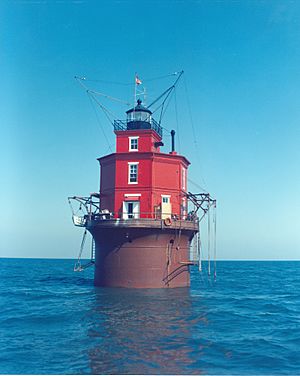Wolf Trap Light facts for kids
 |
|
|
|
|
| Location | Off the west shore of the Chesapeake Bay, Virginia, northwest of the mouth of the York River |
|---|---|
| Coordinates | 37°23′24″N 76°11′24″W / 37.39000°N 76.19000°W |
| Year first constructed | 1821 (lightship) 1870 (first fixed light) |
| Year first lit | 1894 (current structure) |
| Automated | 1971 |
| Deactivated | 2017 |
| Foundation | Caisson |
| Construction | Brick |
| Tower shape | Square tower on octagonal building |
| Markings / pattern | Red brick on red-brown cylinder, black lantern |
| Focal height | 52 feet (16 m) |
| Original lens | Fourth order Fresnel lens |
| Current lens | VRB-25 |
| Range | 14 nautical miles (26 km; 16 mi) |
| Characteristic | Flashing white 15s |
| Admiralty number | J1618 |
| ARLHS number | USA-903 |
| USCG number | 2-7255 |
The Wolf Trap Light is a special kind of lighthouse called a caisson lighthouse. You can find it in the Chesapeake Bay in Virginia. It's about seven and a half miles northeast of another lighthouse, the New Point Comfort Light. This lighthouse is also listed on the National Register of Historic Places, which means it's an important historical site.
Contents
History of Wolf Trap Light
Why is it Called Wolf Trap?
The area where the lighthouse stands is called Wolf Trap Shoal. This name comes from a British ship named HMS Wolf. In 1691, this ship got stuck, or "grounded," here. The Wolf was a navy ship that helped make sure trade laws were followed and fought against pirates.
Early Lightships and the Civil War
In 1821, a lightship was placed at Wolf Trap Shoal. A lightship is like a floating lighthouse. This first ship was updated in 1854. But during the Civil War in 1861, soldiers from the Confederate side destroyed it. Two years later, a new lightship was sent to take its place.
First Fixed Lighthouse and Ice Damage
In 1870, a screwpile lighthouse was built on a hexagon-shaped base. This lighthouse was built in sections at a place called Lazzaretto Point in Baltimore. It stood strong until 1893. That year, thick ice broke the lighthouse right off its base! The lighthouse keeper was lucky and managed to escape. Later, the lighthouse building was found floating far south at Thimble Shoals. Workers were able to get the lantern and lens back.
Building the Current Lighthouse
After the old lighthouse was destroyed, a special boat called a lighthouse tender was used as a temporary lightship. The government asked for money to build a stronger lighthouse. This new lighthouse would be a "caisson" type.
Building started and finished in 1894. A wooden caisson (a watertight structure) was used for the base. On top of this, a cylinder made of cast iron plates was added. The lighthouse building itself was made of brick. It was painted red in the late 1920s. The building has two stories with the lantern on its roof. To protect it from ice, many large rocks were placed around the base.
Changes and Automation
At first, the light was always on, but people complained it was hard to see. So, in 1895, the light was changed to flash. This made it much easier to spot. In 1971, the lighthouse became automated. This means it no longer needed a keeper living there. A new lens was put in in 1984, and then the current VRB-25 lens was installed in 1996. The lantern also has black blinds to stop extra reflections from the glass.
New Owners of the Lighthouse
In 2004, the Wolf Trap Light was offered to groups that wanted to preserve history. No one applied, so it was put up for auction in 2005. A person named Nick Korstad bought it. He wanted to turn it into a bed and breakfast, but he couldn't get the money he needed. After trying to sell it on eBay, he sold it privately. Dr. James Southard, Jr. bought the lighthouse for $119,000. In 2012, the lighthouse was for sale again, along with a piece of land nearby.
 | Frances Mary Albrier |
 | Whitney Young |
 | Muhammad Ali |


